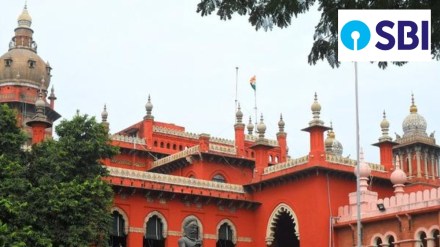The Madras High Court has declined to intervene in a case where the State Bank of India (SBI) cancelled the appointment of a candidate due to an adverse history in his CIBIL report. Justice N Mala observed that the banking sector requires a high standard of financial discipline from its employees, as they are entrusted with managing public funds.
The court held that a person who has shown poor financial discipline cannot be relied upon to handle public money responsibly.
The judge noted, “One more aspect that needs mention here is that the bank took a prudent decision that the candidates with history of default in repayment of loans and adverse CIBIL and other external agencies report were ineligible. The probable rationale behind the said criteria may be that in banking business, the employees deal with public money and therefore financial discipline needs to be strictly maintained. Further, there must be efficiency in handling public money and obviously a person with poor or no financial discipline cannot be trusted with public money.”
Candidate claims clean record
The petitioner, who had applied for the post of Circle Based Officer (CBO), argued that he had fulfilled all eligibility requirements. He told the court that he cleared the exam, interview, medical test, certificate and document verification, including the CIBIL check. Based on this, he was issued an appointment letter on March 16, 2021.
He submitted that his CIBIL report was generated on March 12, 2021 and he was subsequently asked to explain certain points. Despite furnishing an explanation and requesting that he be allowed to continue, the Bank cancelled his appointment. He insisted that, as of the date of the job notification, he had no outstanding dues or adverse credit remarks, and had cleared all previous loans. He further contended that neither CIBIL nor any other agency had listed him as a defaulter.
Alleges discrimination in SBI’s selection process
In support of his argument, the petitioner alleged that some other candidates, despite having defaulted on their loans at the time of notification, were still appointed and thus his disqualification amounted to discrimination. He said the invocation of Clause 1(E) of the eligibility rules to terminate his appointment was both arbitrary and illegal.
SBI, however, stood firm on its position. The Bank submitted that according to Clause 1(E) of its eligibility criteria, any candidate with a record of loan default or adverse CIBIL/external agency reports was ineligible for appointment. It pointed out that the petitioner’s CIBIL report indicated a negative credit history, including defaults in loan and credit card repayments.
The Bank further contended that the petitioner had withheld crucial financial information and therefore, could not claim the right to continue in service. Regarding the discrimination allegation, the Bank clarified that the petitioner’s case involved multiple defaults, which set it apart from other candidates.
Court examines credit records, finds multiple defaults
The court, after reviewing the records, observed that the eligibility clause clearly mandated a clean credit record, without any history of default. The CIBIL report produced by SBI showed nine irregular credit facilities and more than ten credit enquiries against the petitioner. Moreover, the court noted that the petitioner had himself admitted to having defaulted on loan repayments.
The court also dismissed the allegation of discrimination, stating that appointments were made strictly for those who met all eligibility requirements.
